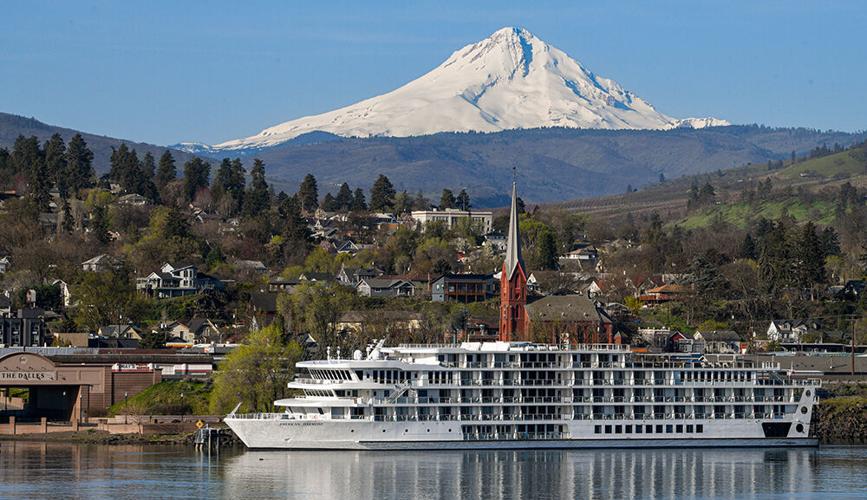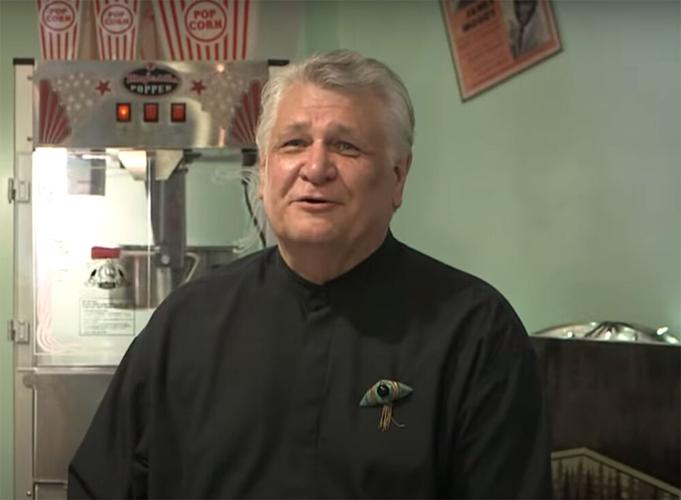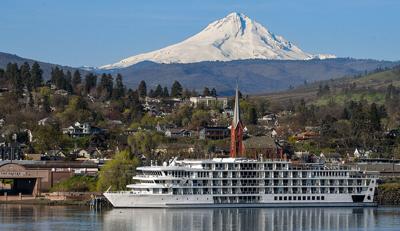CORRECTION: A previous version of this story listed Steve Lawrence as the owner of KODL radio. This is incorrect. The owner of KODL radio is Al Wynn.
THE DALLES — Any visitor who pays to stay overnight in The Dalles will see a “transient lodging tax” added to the bottom of their hotel or vacation rental bill: 1.5% for the state, and 8% for the city. In the 2024-25 year, the city has collected approximately $1.45 million through this tax, roughly double the amount it collected in 2014, 55% of which goes toward promoting tourism.
Since 1977, this pool of funds has been managed almost exclusively by The Dalles Area Chamber of Commerce, which developed the “Explore the Dalles” brand. That could have changed this year when the city opened up requests for proposals in February to other entities with a vision for bringing in more tourism, receiving proposals from the Granada Theatre, The Neon Sign Museum, Noble Consulting, and Portland-based Watson Creative.
After getting input from an ad-hoc committee convened by the city, The Dalles City Council voted to renew its commitment to the chamber, awarding a three-year, $465,000 contract at a special meeting on June 2.
This new contract makes several key changes to its previous iteration, including adding a new chamber employee to manage tourism marketing and resuming management of marketing the cruise ship industry.

Lisa Farquharson, chamber CEO
“For our organization, it was a powerful moment of reflection and reaffirmation,” said Chamber CEO Lisa Farquharson in a statement emailed to Columbia Gorge News. “There’s been public speculation that our involvement in tourism was assumed or automatic — but this process demonstrated otherwise. It invited competition, allowed every proposal to stand on its own merit, and ultimately returned the contract to us.”
Farquharson said the potential of losing the tourism contract caused the chamber to pause all planning for future marketing initiatives, leaving just four weeks of preparation before the contract takes effect.
“That timeline is no small hurdle in the world of tourism, but we understand the importance of a fair and transparent public process. The city had to ensure they were selecting the right partner, not just based on history, but on capability, performance, and vision,” she said.
Committee emphasized working with local entity
On April 10, the ad-hoc committee scored the three fully or partially qualified proposals on seven criteria:
- General tourism marketing,
- Visitor hospitality services,
- Major events,
- Cruise-ship industry coordination,
- Media campaigns,
- Content marketing, and
- Marketing analysis/data reporting.
After discussion, the committee recommended awarding the contract to the chamber, noting specifically that the contract should go to a local company.
Comments from the committee, quoted in the staff report, said, “This is about more than simply ‘managing’ the visitor experience — it is about exploring community expectations, a possible branding refresh, anticipating fiscal challenges, and identifying an ‘image’ reflecting our community’s multi-faceted character.”
Committee members also urged inclusion of a “Destination Development Plan:” A community-wide workshop to establish a strategic framework for tourism — directly in the scope. In response, city staff and the chamber negotiated final scope and budget adjustments to reflect that addition, refined reporting periods, and improved weekend visitor information methods.
Potential grant sweetened chamber’s offering
City Manager Matthew Klebes pointed to several advantages of working with the chamber again, particularly an application for a new grant from Travel Oregon Competitive Grant application — submitted in February for $93,000 (with a $5,000 in-kind match from the chamber) — to fund a Destination Development Plan.
If awarded, the plan will run through November 2026 and include forming a steering committee, extensive public engagement (surveys, focus groups, workshops), asset mapping, visioning, and final recommendations for a five-year strategic roadmap.
Farquharson said she and her team expect news about the grant on June 17.
“We’re excited. We’re prepared,” she said. “And we’re deeply committed to stewarding this opportunity in a way that brings lasting benefit to The Dalles.”
Another advantage the city noted is the chamber’s collection of visitor data and demographics through the digital program Datify, which traces ad clicks with real-time visits with users’ phones.
Klebes expressed enthusiasm in working with the chamber to expand this service’s capabilities.
“We can look for particular trends. We can really target something … and see if we can make a difference or a change or an improvement, and have that data to back it up,” he said.
‘Spotlight Tourism Center’ still on
Chuck Gomez, owner of the Granada Theatre, told Columbia Gorge News in an email that despite not receiving the tourism promotion contract, he still plans on conducting tourism promotion through his business.

Chuck Gomez, Grenada Theatre
“We are continuing moving forward with our downtown ‘Spotlight Tourism Center’ in the heart of the historic district at the Granada theater, where formerly the ‘Siberian Cream’ parlor had been located,” he said, adding that this location is within advantageous proximity to the new Federal Street project.
Gomez reiterated his belief that The Dalles has the resources and potential to become a top weekend getaway for the region. He said that the chamber previously has not operated this contract with enough accountability, transparency and budgetary reporting.
“We have seen previous budgets of nearly half a million dollars produce limited overall results and meager tourism growths,” he said.
Looking forward, Gomez said he would welcome the opportunity to subcontract for the chamber for future tourism promotion projects, “which has always been our ultimate goal for the betterment of all,” he said.
Questions about approach, transparency
Along with Gomez, former mayor Steve Lawrence, and owner of KODL radio Al Wynn, have both expressed concern about the chamber’s management of tourism promotion on local daily show “Coffee Break,” put on by Wynn.
“My objection is that it always seems as if the chamber is on an island and not part of that broader tourism community,” Lawrence said. He mentioned some instances when he, Wynn, Gomez and others felt excluded from chamber-run activities.
Lawrence said he believes physical tourism destinations can more reliably track visitors than the digital products the chamber relies upon.
“I think there’s been a gradual, natural increase in tourism after COVID. People wanted to get out, and places like the Granada and the Neon Sign Museum and the Civic Auditorium and the Fort Dalles Museum, they do their own thing, and a lot of people come in for that reason,” he said. “I disagree with this issue of Datify, because Datify has no flesh on it. You can’t isolate why that person pinged. It could be somebody driving from Boise to Portland.”
Wynn also said he feels more physical marketing campaigns, like billboards, are preferable, as well as centering more of the outreach on the city’s historical roots. But central to the critiques on “Coffee Break” are Lawrence, Wynn and Gomez’s questions about the chamber’s spending.
“It’s a sizable amount of money, and we need to know where all of it goes and what they’re doing,” Wynn said.
“This is money that belongs to the taxpayers, the citizens,” Lawrence said.
Columbia Gorge News asked Lawrence what additional information he is looking for, besides the detailed annual reports which include granular examples of spending and budgets identical in scope to the city’s.
“I wanted to see the chamber’s full budget, because you cannot tell from the way the presentation is made of what portion of their overhead we’re supporting,” he said. “I asked for that for six years [as mayor], and never did get it.” Lawrence said he’d like the city to review the full budgets of any business holding a tourism contract.
When Columbia Gorge News asked Klebes about reviewing the chamber’s full budget, he said the city doesn’t ask for this information because terms of the contract strictly inform the use of funds within the defined scope of work and require rigorous reporting on that spending, just like any contract with the city.
“If we hire a company to do a street or I hire an architect to do a rendering, it is not standard in that contract that I can see the entirety of that firm’s books for projects or activities unrelated to the contract that I hired them for,” Klebes said.
Gomez, Wynn and Lawrence each told Columbia Gorge News they are happy with many aspects of the new contract between the city and the chamber, especially the new tourism director position which draws a clearer line between chamber and tourism activities.
Officials say they’re satisfied with chamber’s transparency
The contract lays out an annual report “detailing engagement metrics, campaign performance, ROI evaluation, Transient Lodging Tax (TLT) impact, business feedback, and strategic recommendations.”
The city may also request up to four quarterly updates per year.
Further, under “Market Analysis and Data Reporting,” the contract requires:
- Tracking lodging tax performance, digital campaign ROI, and event engagement.
- Presenting annual and quarterly tourism reports to the city.
- Using real‐time analytics to adjust campaign targeting and spending as needed.
- Benchmarking progress against tourism KPIs, including visitor counts, hotel bookings, website traffic, and digital conversions.
Klebes told Columbia Gorge News the new contract retains the previous contract’s reporting granularity and financial transparency.
He said in the June 2 meeting, “Article VII of the contract is a robust records and accounting provision which the chamber has been fulfilling with their previous contract, giving the city the information and insight as to how the monies are being spent.”
Former city council member and new chamber board member Darcy Long, who has worked as a financial advisor since 2015, pointedly said that in her view, the chamber has and continues to satisfy the city’s requirements for transparent reporting.
“Some of the past accusations were that the chamber was using that money to support businesses rather than tourism. As a past council member, I saw the budgets and the numbers, and I was very impressed with that,” she said.
Long added that the new executive tourism director role will “really help delineate that line,” ensuring that all tourism‐related revenues and expenditures are tightly scoped and reported.
The chamber’s proposal included more than 20 letters of support from government officials, local businesses, and industry partners. Among them, Wasco County Commission Chair Scott Hege wrote:
“The Dalles Area Chamber of Commerce has consistently demonstrated leadership, creativity, and measurable results in promoting tourism for our region. Their proactive approach — applying for Travel Oregon grants, coordinating with local attractions, and fostering regional partnerships — drives economic growth and benefits every sector of our community. I strongly support their continued partnership with the City of The Dalles.”
Similarly, Mid-Columbia Economic Development District Executive Director Jessica Metta applauded the chamber’s past role:
“As a key economic development partner, the chamber’s tourism-aligned strategies have driven local investment, strengthened regional branding, and supported small businesses. Their professional execution and collaborative spirit make them the most qualified tourism partner for The Dalles.”
New tourism director position draws clearer boundaries
The packet also outlines how hiring a dedicated executive tourism director further clarifies financial boundaries between the chamber’s membership services and the city’s tourism contract.
In the “Personnel & Organizational Structure” section, the chamber explains: “The budget reflects a reallocation of salary funding to accommodate a full‐time Executive Tourism Director and dedicated support team. The CEO will transition to a full‐time focus on chamber support, member services, and advocacy, while tourism efforts are managed by a dedicated industry expert.”
By reallocating existing staff resources (rather than co‐mingling tourism personnel with general chamber staff), the chamber establishes “greater strategic oversight, marketing execution, and industry partnerships,” while ensuring “responsible stewardship of city funds through transparent and data‐informed budgeting.”
Council members supported this delineation.
A key new element in the contract clarifies roles around cruise-ship coordination — an area that has shifted among multiple stakeholders over the years.
Klebes clarified that while the city operates the marine terminal and facilitates docking logistics, the new contractor would engage cruise lines, connect passengers to local excursions, and work with partners like The Dalles Main Street.
“We’ve had some shifting of this responsibility over the years,” Klebes said. “We really made a point to include this as one of the elements of the scope of work for that clarity and refinement as we move forward.”
Columbia Gorge Discovery Center & Museum Executive Director Cheryl Rager, who served on the ad hoc committee, shared during the public comment period that the Discovery Center works closely with the cruise line.
She noted that excursions frequently go outside The Dalles, listing Maryhill Winery and the Bonneville Dam as examples, but emphasized that local coordination remains vital.
After the new contract passed, Farquharson thanked the council.
“We’ve been doing this for a while, and we look forward to having some new aspects, new direction,” she said. “I’ve been asking for 12 years, ‘What would you guys like to see?’ and I’m getting it, so thank you.”

























Commented